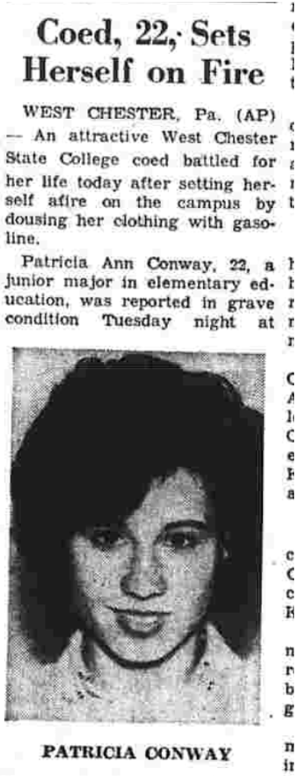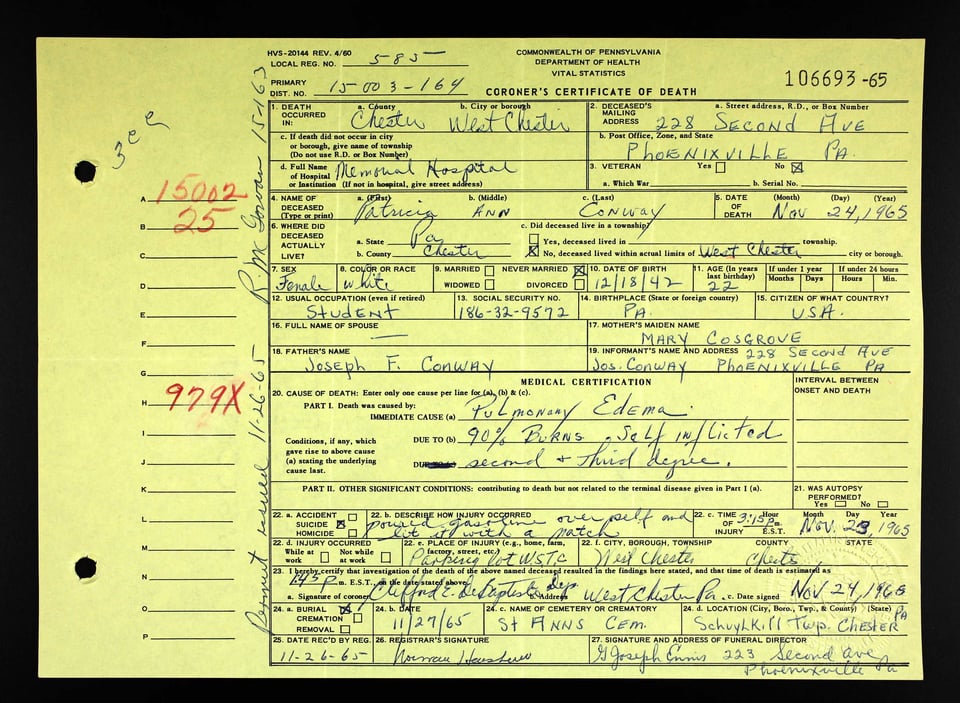Patricia Ann Conway
[Content warning: this post is about self-immolation and protest]
I taught a class this semester on power and privilege in higher education. One of the themes of the course is student activism and I wanted to tell the class about movement work on or near our university over time. While I was preparing my lecture I came across a story that was shocking and confusing which, given what’s happening on college campuses now, resonates even more.
At this point we've all heard about Aaron Bushnell, the member of the US Air Force that lit himself on fire to protest the war in Palestine. Someone recently did the same thing outside of Trump’s trial the other week. Also well-known, historically, is Thích Quảng Đức, the Buddhist monk who self-immolated in protest against the United States' war in Vietnam in 1963.
But have you ever heard of Patricia Ann Conway? I hadn't before I put together my lecture. She was an elementary education student, studying to become a teacher, at West Chester University.
On November 23, 1965, she lit herself on fire on campus. But the story goes in a few surprising directions and something doesn't seem right. Reporting on the story from the time is a mixture of political obfuscation, patriarchy, and sexual innuendo.
The coverage
There's very few mentions of Conway that I've been able to find through simple internet searches. Her obituary website has a full newspaper clipping, a partial one from another paper, and a picture of her death certificate. I've transcribed the clippings below.
The full newspaper clip has a picture of her, which I'm including here. If you read the first paragraph, you'll start to see the nature of this coverage, which begins by calling Conway "attractive."

Here's the full newspaper clipping, after which I’ll do a little commentary:
HEADLINE: A coed who set herself on fire because of "personal" problems, died today at the Memorial Hospital of Chester County.
An attractive West Chester State College coed battled for her life today after setting herself afire on the campus by dousing her clothing with gasoline.
Patricia Ann Conway, 22, a junior major in elementary education, was reported in grave condition Tuesday night at Memorial Hospital. She suffered second-and third-degree burns over the upper part of her body.
"I did it because I love my God," doctors and schools officials quoted her as saying. "I did it because of a personal thing."
She said that it had nothing to do with the world situation or Viet Nam, referring to the recent cases of suicide by immolation in protest against government policies.
Bought Gasoline Sunday
State police at nearby Exton said the Phoenixville, PA girl told them she had bought the can of gasoline last Sunday. They said she no indication other than "personal reasons," why she set herself afire.
Her father, Joseph, told newsmen he knew of nothing that would lead her to such an act.
He described his daughter as a quiet girl who spent most of her time at her studies or at her part-time job as a student assistant to a West Chester dean.
He said his daughter had occasional dates, but was not serious about anyone as far as he knew.
Fellow students said they knew of no reason why she would want to harm herself. They described her as quiet and reserved and a good student.
Miss Conway lived at the Russell House, a college-approved off-campus rooming house where she shared a room with three girls.
Mrs. Karl Russell, who runs the house, said, "She is a very nice girl, a quiet one. She didn't seem to have any problems."
She said Miss Conway had asked her for a mop to help clean the room earlier in the day and she seemed entirely normal and composed.
According to the police account, the girl set herself afire in an area used partially as a parking lot on campus. Several persons were nearby, loading luggage into their cars in preparation for the Thanksgiving holidays.
No one actually saw her set herself on fire, police said, but several persons saw her in flames almost immediately.
David E. McKenty, an assistant professor of English, ran over to the spot.
"I was sitting in a car nearby with a friend when I heard two girls yell out," he said. "At first I thought it was rubbish burning. Then I saw some feet sticking out and thought it might be a person. As I got closer I saw it was a girl and threw my coat on her."
He was quickly assisted by a student, Dennis Coll Jr., Landsdowne, PA, and the Rev. Warren Loesch, Harrisburg, who also tried to smother the flames with their coats.
Here's part of another clipping, the obituary website doesn't have the rest of it:
HEADLINE: Motive Sought in Coed Death--
The death of Patricia Ann Conway, 22-year-old co-ed who turned herself into a human torch on the West Chester State College campus has left unanswered the question of why she took her own life.
Her death Wednesday, which came less than 24 hours after she pouted gasoline over her clothing and set herself afire, was officially attributed to fluid in the lungs, which were burned from inhaling fumes.
Before she died, the Phoenixville, Pa., girl told hospital and college officials she did it because of "My love of God. I did it because of a personal thing."
Her parents, Joseph F. and Mary A. Conway, could think of no reason for the act.
The only hint came from Dr. Jack Owens, dead of students, who theorized that she was disturbed about an on-and-off romance and "because of her deep religious feeling that she might have hurt a human being..."
Here's her death certificate:

The only other mention I could find of Conway is from a 2015 story by a writing student, Christopher Sinatra, in a small upstate New York newspaper. Sinatra investigated the story of Ronald Brazee, a sixteen year old boy who lit himself on fire near a church in Syracuse in 1968.
Sinatra lists a number of young people who followed the Buddhist monk's immolation protesting the Vietnam War. Conway is on his list, with her words quizzically juxtaposed with the politics of the moment:
The fiery image became an icon and was emulated around the world – even in the United States. Alice Hertz, Norman Morrison, Robert Chevalier, and George Winne, among others, were inspired by Quảng Đức. In 1965, a junior at West Chester State College, Patricia Ann Conway, told people she did so, “because I love God.” She insisted that she was not protesting the war, saying, “I did it because of a personal thing.”
What's going on?
The question is why did a young, white, quiet, and studious undergraduate woman studying to become an elementary school teacher light herself on fire on her small town college campus?
Sinatra's implication is that Quảng Đức inspired her, along with a number of other young people, none of whom had cell phones with video cameras with which they could record a video explicitly detailing their motives like Bushnell did. According to this theory, Conway was protesting the war. This makes some sense given the spate of copycat immolations that followed the monk's and the intensity of the antiwar movement.
Conway's parents didn't know why she did it and wouldn't say in the reporting above. But police and school officials, apparently, were very clear: this was personal, not political. They say in no uncertain terms that Conway's self-immolation was not about Vietnam. These officials say that Conway told them, in fact, that it was a personal thing, more about her love for God.
The Dean of Students, Jack Owens, speculated further that it had to do with a romantic relationship Conway had. His insinuation is that she hurt someone's feelings and, because she was religious, she felt so much guilt that she lit herself on fire in public.
But this jilted lover theory has a lot to answer for. Conway's parents didn't think she was in a relationship of any kind. And, in a curious detail, we know that Conway actually worked part time for a dean of students at West Chester. Likely Owens himself, the same one who said she’d “hurt someone’s feelings.”
If her parents didn't think she was in a relationship, and everyone she lived with--the director of her rooming house, her roommates--says that all she did was study and go to work, I have to wonder whether Dr. Owens was somehow romantically involved with her, and, I have to imagine, not in a good way. The fact that she was religious makes this more likely, maybe: she wouldn't have chosen to be in that kind of relationship unless it was somehow coercive.
We actually don't have any direct statements from Conway herself about why she lit herself on fire. All we have are statements from police and school officials who assure us it wasn't “political,” by which they mean about Vietnam. The closest thing we have to her own words are "I did it because of a personal thing...because I love God."
The statement could mean either a political or a romantic sentiment, or both, or something else completely. Indeed, many religious Christians protested the war, Daniel Berrigan most famously (which Sinatra notes). But I have trouble believing that Conway did this extreme thing, something associated with the antiwar movement, something a number of other young people did too, for romantic reasons. Was she overwhelmed with guilt and shame for an inappropriate relationship with the Dean?
Maybe this jilted lover narrative is a cover up for the political reality of the situation. Whether or not she had antiwar intentions, it seems to me that the school and police officials are trying their best to make sure her actions aren't interpreted as being about the war. If it turned out that this young unassuming woman training to teach young children in conservative eastern Pennsylvania lit herself on fire to protest the war, it could inspire more disruption, rebellion, etc.
Her supposed words--which aren't actually hers, but are secondhand from the police and school officials--are fishy. They're wording is slightly different across the newspaper articles. And I have a hard time believing that someone who just lit themselves on fire, whose lungs were filled with liquid due to the fumes she'd inhaled, would say something like "it was a personal thing." That sounds like someone who's making an offhand, casual comment rather than someone suffering from third degree burns.
It's a sad, scary, and tangled mystery.
As the situation in Palestine gets worse and worse, more nightmarish by the day, and as the antiwar movement that's been born from those flames gets stronger in the form of student protest, I've been thinking a lot about this story, particularly in this moment of campus politics, when sexual violence is a perpetual issue.
Something burned within Patricia Ann Conway, and, for some reason, she decided to make that fire appear.